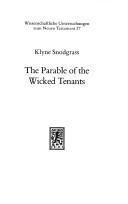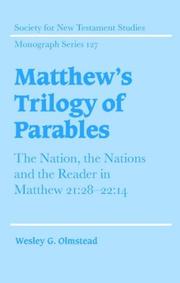| Listing 1 - 3 of 3 |
Sort by
|

ISBN: 3161446100 9783161446108 Year: 1983 Volume: 27 Publisher: Tübingen: Mohr,
Abstract | Keywords | Export | Availability | Bookmark
 Loading...
Loading...Choose an application
- Reference Manager
- EndNote
- RefWorks (Direct export to RefWorks)
Book
ISBN: 887653718X 9788876537189 Year: 2019 Publisher: Roma G&B Press
Abstract | Keywords | Export | Availability | Bookmark
 Loading...
Loading...Choose an application
- Reference Manager
- EndNote
- RefWorks (Direct export to RefWorks)
"La parábola de los viñadores homicidas (Mc 12,1-12) esconde una tensión interna que no es evidente a primera vista. La cita del salmo 118 con la que concluye (Mc 12,10-11) no solo parece innecesaria, sino que recurre a un imaginario ajeno al que se había empleado en la narración que pretende explicar (Mc 12,1-9). La opción más habitual ha sido considerar que la cita es el torpe añadido de una confesión cristológica. Este estudio tiene como punto de partida la intuición de que el Antiguo Testamento puede ser la clave interpretativa de este pasaje que suavice la tensión que encierra en su interior. Esta tesis demuestra, por una parte, que Sal 118,22-23 resulta coherente con el uso marcano del Antiguo Testamento. Por otra parte, comprobamos que el trasfondo veterotestamentario, entendido este de modo amplio e iluminado por la literatura judía intertestamentaria, ofrece un denso entramado de conexiones entre la parábola y la cita sálmica con la que se interpreta."--
Wicked husbandmen (Parable) --- 226.3 --- 226.3 Evangelie volgens Marcus --- 226.3 Evangile de S. Marc --- Evangelie volgens Marcus --- Evangile de S. Marc --- Husbandmen, Wicked (Parable) --- Wicked tenants (Parable) --- Wicked vinedressers (Parable) --- Bible. --- Marco (Book of the New Testament) --- Mark (Book of the New Testament) --- Markus (Book of the New Testament) --- Markusevangelium --- Vangelo di Marco --- Book of Mark --- Criticism, interpretation, etc. --- Relation to the Old Testament.

ISBN: 0521831547 0521036305 1107139147 0511180470 0511063040 0511307381 0511488122 1280421800 0511204558 0511071507 9780521831543 9780511063046 9780511488122 9780521036306 Year: 2003 Volume: 127 Publisher: Cambridge, UK ; New York : Cambridge University Press,
Abstract | Keywords | Export | Availability | Bookmark
 Loading...
Loading...Choose an application
- Reference Manager
- EndNote
- RefWorks (Direct export to RefWorks)
Wesley Olmstead examines the parables of the Two Sons, the Tenants and the Wedding Feast against the backdrop of the wider Matthean narrative. He explores Matthew's characterization of the Jewish leaders, the people and the nations, and assesses the respective roles of Israel and the nations in the plot of Matthew's Gospel. Against the current of contemporary Matthean scholarship, Olmstead argues both that the judgement this trilogy announces falls upon Israel (and not only her leaders) and that these parables point to the future inclusion of the nations in the nation that God had promised to raise up from Abraham. Bringing both literary-critical and redaction-critical tools to bear on the texts at hand, Olmstead not only elucidates the intended meanings of this parabolic trilogy but also attempts to determine the responses they elicited from their first readers. Transcending Matthean scholarship, this book has implications for all Gospel studies.
Two sons (Parable) --- Wicked husbandmen (Parable) --- Great supper (Parable) --- Jews in the New Testament --- Bible --- Criticism, interpretation, etc --- Bruiloftsmaal (Parabel) --- Feast [Parable of ] --- Festin des noces (Parabole) --- Gentiles in the New Testament --- Gentils dans le Nouveau Testament --- Great Feast (Parable) --- Guest who made excuses (Parable) --- Heidenen in het Nieuwe Testament --- Invités discourtois [Parabole des ] --- Joden in het Nieuwe Testament --- Juifs dans le Nouveau Testament --- King's son [Marriage of ] (Parable) --- Marriage of the king's son (Parable) --- Noces [Festin des ] (Parabole) --- Onwillige genodigden (Parabel) --- Supper [Parable of ] --- Unwilling guests (Parable) --- Wedding feast (Parable) --- Wedding garment (Parable) --- Bible NT. Gospels. Matthew --- 225*33 --- 226.2 --- 225*33 Parabels. Gelijkenissen --- Parabels. Gelijkenissen --- Husbandmen, Wicked (Parable) --- Wicked tenants (Parable) --- Wicked vinedressers (Parable) --- Feast, Parable of --- Great feast (Parable) --- Guests who made excuses (Parable) --- King's son, Marriage of (Parable) --- Supper, Parable of --- Evangelie volgens Matteüs --- Bible. --- Criticism, interpretation, etc. --- Bible. N.T. Matthew XXI,28-XXII,14 --- Arts and Humanities --- Religion --- Gentiles in the New Testament. --- Jews in the New Testament.
| Listing 1 - 3 of 3 |
Sort by
|

 Search
Search Feedback
Feedback About UniCat
About UniCat  Help
Help News
News